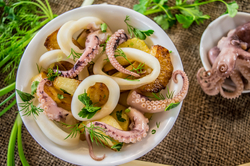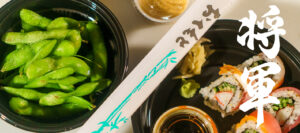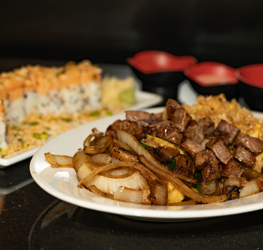Octopus vs. Calamari: is there really a difference?
Octopus and Calamari both live in saltwater from the tropics to temperate zones.  Like clams and oysters, octopus and calamari are mollusks (invertebrate sea creatures), classified as cephalopods, meaning “head-footed.” The ”arms,“ are connected to their heads, while the rest of the body is in front of the head.
Like clams and oysters, octopus and calamari are mollusks (invertebrate sea creatures), classified as cephalopods, meaning “head-footed.” The ”arms,“ are connected to their heads, while the rest of the body is in front of the head.
Characteristics: Cephalopods are physiologically similar to other mollusks, but the main difference is their lack of a shell. An octopus does not have a shell at all, while calamari has a small internal flexible backbone called a pen. When in danger, both use defense mechanisms, such as swimming away quickly, camouflaging themselves, and shooting ink at their predators.
Habitat: Calamari swims in the open ocean waters, either alone or in schools, and uses its eight sucker-lined arms and two specialized tentacles to catch its prey, which consists of various fish and shrimp. Octopus are solitary creatures that live in dens on the seafloor, which trap their prey of bottom-dwelling crustaceans and mollusks, by using its eight arms lined with suckers.
In the battle of Octopus vs. Calamari, which is the winner? Is one more delicious than the other? What is the true difference between the two?
Octopus vs. Calamari: How do they Differ in Taste and Cooking?
Octopus is commonly confused with calamari, though both are surprisingly different in taste (when served raw) and cooking methods. Many people think calamari dishes are made from octopus, when in fact calamari is actually made from a type of squid. This confusion could be due to similar tastes when the octopus is prepared. Here are some of the main differences when it comes to octopus vs. calamari.
-
Octopus
Octopus has a light taste that some compare to chicken or even pork. A low-calorie protein, both nutritious and filling, the octopus is full of vitamins and is low in fat and high in iron. Octopus can be prepared by blanching it in boiling water and then baking it, as well as boiling, grilling, or poaching. Because octopus evolves in taste depending on what ingredients are used when cooking, many prefer to eat it raw.
-
Calamari
Calamari can be a bit tougher than an octopus but the meat has a smoother texture, and when cooked right is tender and firm. The meat of calamari easily soaks up butter and sauces and can be prepared in a number of ways, such as braising, boiling, searing, and grilling. The key to getting a tender texture as opposed to a chewy one is by cooking the calamari hot and fast or low and slow. Cooking at temperatures in between will leave you with unpleasantly tough meat.

Octopus vs. Calamari: Experience the Taste of Japan
 Discover the deliciousness of both by ordering octopus nigiri or sashimi as an appetizer, and then calamari as an entrée served with teppanyaki vegetables, fried rice, soup, and house salad with ginger dressing. The truth is, when it comes to octopus vs. calamari at Shōgun, there’s no way to lose. For one of the most unique dining experiences in Orlando, join us at Shōgun Japanese Steakhouse by calling 407-352-1607 to reserve your table.
Discover the deliciousness of both by ordering octopus nigiri or sashimi as an appetizer, and then calamari as an entrée served with teppanyaki vegetables, fried rice, soup, and house salad with ginger dressing. The truth is, when it comes to octopus vs. calamari at Shōgun, there’s no way to lose. For one of the most unique dining experiences in Orlando, join us at Shōgun Japanese Steakhouse by calling 407-352-1607 to reserve your table.



